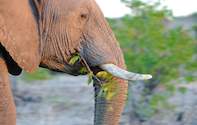
An African Elephant, Loxodonta africana, is quite picky when it comes to eating. A study of this mega-herbivore's dietary habits reveals this mamma does not eat just anything, despite its large size and fast-operating digestive system.
An adult elephant can consume up to 136kg (300 pounds) of a combination of roots, grasses, fruit and bark per day. The large physical being of these herbivores allow (and require) them to eat large amounts of food, as their bodies only process about 40% of what they eat, leaving the other 60% undigested.
An article in an issue of Journal of Mammalogy, describes research led by Norman Owen-Smith and Jonas Chafota in the Kalahari sandveld region of the Chobe National Park of Botswana. They looked at the dietary patterns of 80 000 elephants - what plants these animals select, what parts of a plant they consume, and how their choices vary with seasonal changes.
Previous studies suggested that the larger the animal, the less selective it might be in its diet, due to lower nutrient requirements per unit of body mass. Accordingly, a large animal would be more capable than a smaller one of digesting high-fiber content and potentially toxic chemical contents of some plants. Thus the African Elephant, the largest extant herbivore, should be willing and able to consume a broad variety of plant species.
While its size and hindgut digestion do enable the African Elephant to exploit a large assortment of plants, it seems to occupy a rather distinct niche from other animals in its actual choices.
During the wet season, elephants found only 30 percent of the woody species available for consumption palatable. In the hot, dry season, this increases to 50 percent. While the elephant might eat shoots and leaves during the wet season, it prefers stem, bark, and roots, making up 50 percent of its diet in the cool, dry season and increasing to 94 percent of it consumption in the hot, dry season.
It is not so much the choice of plant species that separates the elephant from other animals, but the selection of plant parts. The African elephant concentrates on the bark, stem, and roots rather than foliage or fruit of plants. These choices reduce the elephant's overlap of food selection with other animals.
"Accordingly, elephants occupy a dietary niche distinct from browsing or grazing ruminants," says Norman Owen-Smith.
"Although commonly classified as mixed feeders along the grass-browse continuum, savanna-inhabiting elephants are distinct from all coexisting ruminants in their dependence on bark, twigs, and roots rather than foliage or fruits during lean times in the seasonal cycle. In this feature, their digestive strategy resembles that of rodents and lagomorphs, also adapted through hindgut digestion to tolerate high dietary fiber contents, rather than grazing or browsing ruminants dependent more narrowly on foliage.
Our findings reinforce Jarman's (1974) contention that niche separation among large mammalian herbivores is governed more fundamentally by differential use of plant parts than by distinctions in the plant species utilized.

 While everyone agrees that elephants eat both grasses and leafy material from shrubs and trees, some debate has been ongoing in scientific c...
While everyone agrees that elephants eat both grasses and leafy material from shrubs and trees, some debate has been ongoing in scientific c...